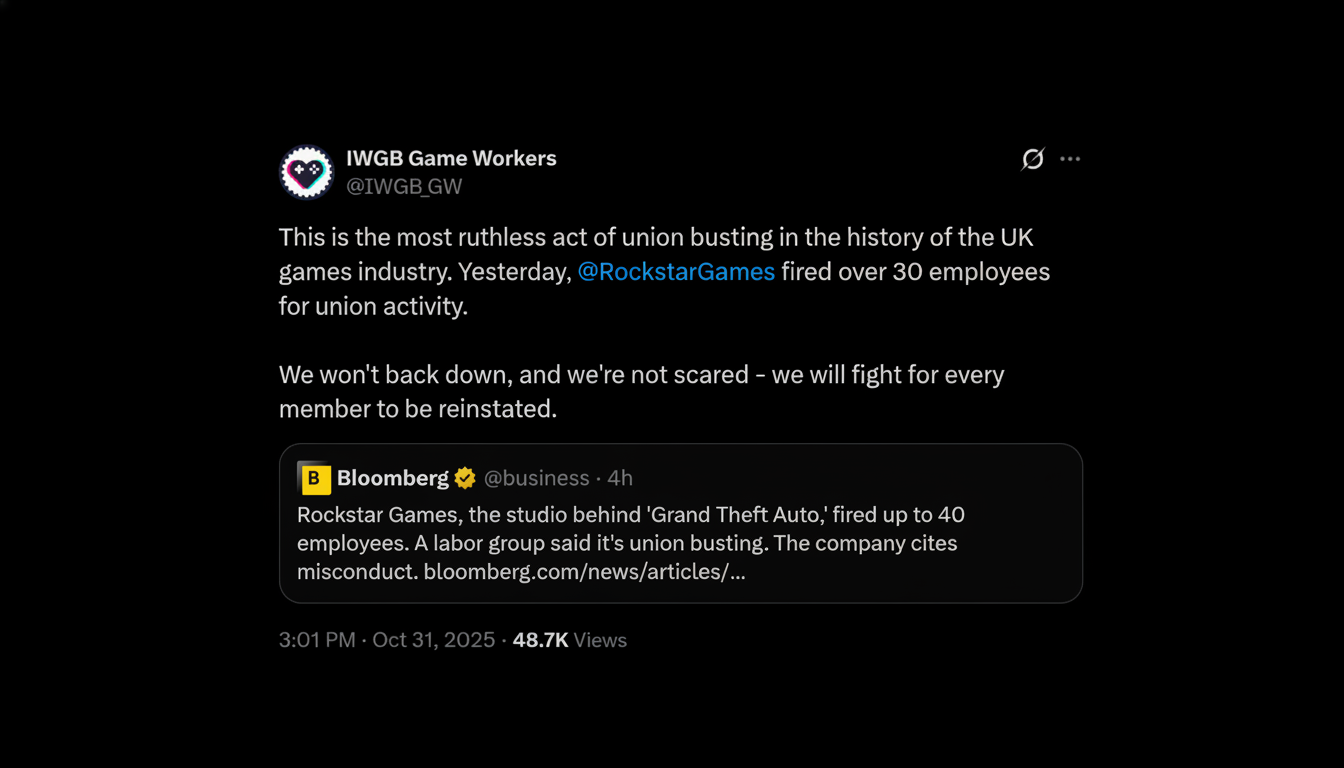Rockstar Games, the studio known for Grand Theft Auto and Red Dead Redemption, is being treated as having laid off dozens of employees to disrupt a promising union effort, sparking a labor flashpoint across big-budget game creation.
What the union claims about the alleged retaliation
The Independent Workers’ Union of Great Britain (IWGB) claims that up to 40 employees in the UK and Canada lost their jobs after participating in conversations about organizing, including a private Discord channel used for union coordination. The union argues that the timing and scale of the layoffs indicate a planned effort to prevent collective action.
- What the union claims about the alleged retaliation
- Rockstar’s response and denial of union-busting claims
- A flashpoint in games labor and industry organizing
- Legal stakes for union activity in the UK and Canada
- Potential impact on GTA VI production and Take-Two's outlook
- What to watch next as claims and responses escalate

IWGB president Alex Marshall claims that the firings were a more aggressive step for the game sector, stating that the union thinks this is a cut-and-dried example of union defeat. The union says it is accumulating information from affected personnel and considering using formal legal measures.
Rockstar’s response and denial of union-busting claims
Rockstar has rejected the claims. In response to Bloomberg, the company stated in a message that it dismissed a proportionately insignificant number of people owing to flagrant offenses and not because of union nuances. No further details concerning the specific nature of the alleged offenses were given.
This sets up a clash of competing stories: a union asserting that the layoffs were conducted in retribution, and a studio alleging that they had been done due to disciplinary actions. If the discussion becomes official, adjudicators will closely examine the paperwork, schedules, and phrasing associated with the layoffs.
A flashpoint in games labor and industry organizing
The accusations land amid renewed scrutiny of labor practices in AAA production cycles. Rockstar has previously faced criticism over long hours during major releases. A New York Magazine profile once cited “100-hour weeks” during Red Dead Redemption 2’s final push, a point Rockstar Games co-founder Dan Houser later narrowed it to a short stint by a subset of the writing team. The episode nonetheless galvanized industry-wide debate about crunch culture.
The wider industry has inched toward organized labor. Quality assurance teams at Raven Software and ZeniMax Studios unionized in recent years, both affiliated with the Communications Workers of America. In the UK, IWGB and the Game Workers branch have sought to formalize support structures for developers across disciplines. Sentiment has shifted as well: the annual State of the Game Industry report from the Game Developers Conference has consistently found a majority of developers support unionization. That growing support raises the stakes for any company accused of suppressing organizing efforts.
Legal stakes for union activity in the UK and Canada
Union activity enjoys legal protections in the UK and Canada. In the UK, the Trade Union and Labour Relations Act framework makes dismissals for engaging in union activities an automatically unfair dismissal. Remedies can include reinstatement or compensation depending on the findings of an employment tribunal.

Canadian labor laws, enforced by provincial or federal labor boards, also forbid reprisals associated with union organizing. If a board deems that a retaliatory firing has taken place, it can require reinstatement with back pay and issue other comparable orders.
In both instances, the critical issue is whether the employer can demonstrate that there exist real and valid non-union-related causes for the dismissal.
Potential impact on GTA VI production and Take-Two's outlook
Even if the number reduced is insignificant, targeted losses in QA, tools, or support can have a significant impact on a blockbuster project. GTA VI is one of the most anticipated releases in entertainment, with budgets and aspirations outside the norm for a game project. For instance, GTA V earned over $1 billion in income in the first four days, establishing a precedent that investors and players use to measure the prospects of the sequel.
Legal disputes and labor strife might ruin a game’s progress and morale, particularly in the final development stages. Studios that have faced issues, such as CD Projekt during the making of Cyberpunk 2077, show how workforce pressure and production discontinuities might amplify technological difficulties.
For Rockstar and its parent company, Take-Two, public clarification of the reasons behind the sudden terminations and the workability of the GTA VI project will be important in restoring investor optimism.
What to watch next as claims and responses escalate
IWGB appeals are set to increase if the union thinks its plaintiffs are strong enough, and the organization may file claims that may require the company to reveal private emails, chat logs, and performance documentation. Rockstar is more likely to highlight its official reasoning and will attempt to recover from any negative publicity and disrupt the GTA VI pipeline as little as possible.
This episode, whatever the fate of this one dispute, highlights just how far from the fringes organizing has moved to the heart of business risk. The precedent might dictate how studios throughout the UK, Canada, and elsewhere deal with employee organizing: passively accepting or pushing the legal limits at the high end of the spectrum.

